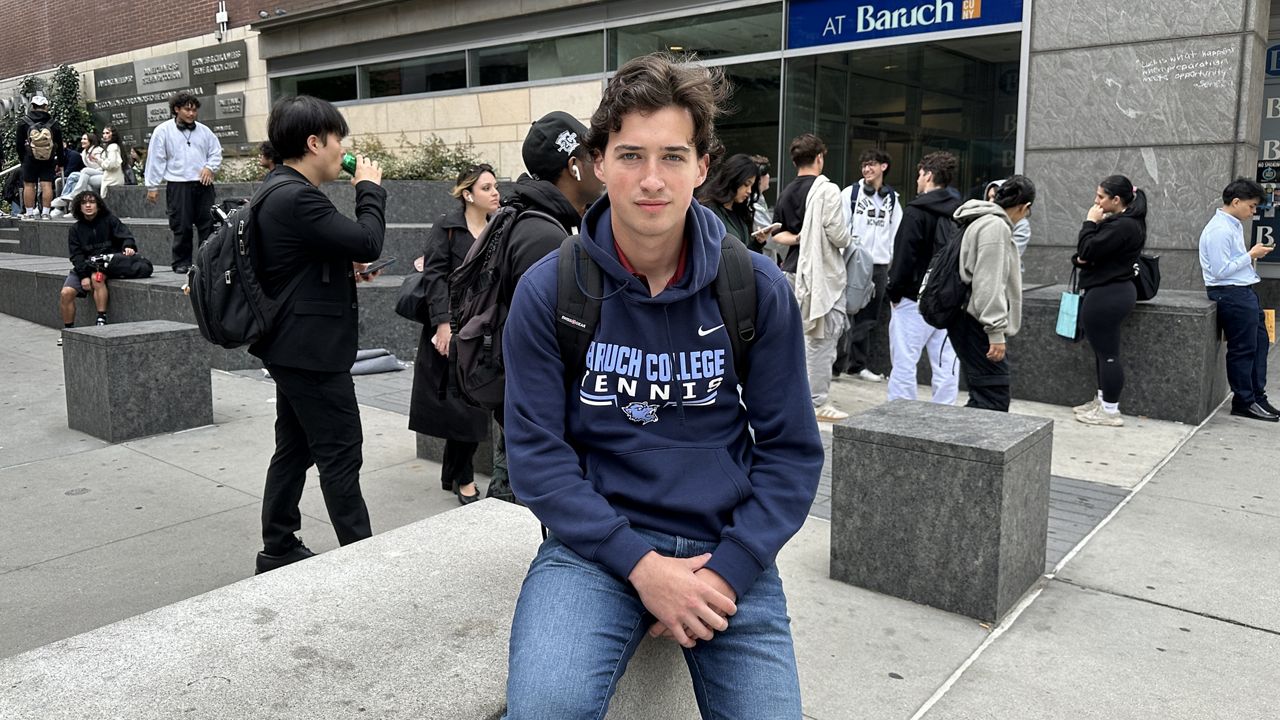The University of Chicago estimates 8.3 million young people will be eligible to vote in November's presidential election. They're part of the Gen Z generation, and a recent UCLA poll found more than half of Gen Z respondents reported staying very informed on all news.
NY1 spoke with some first-time voters in the city about what's motivating them to have their say on who will lead the nation.
What You Need To Know
- The University of Chicago estimates 8.3 million young people will be eligible to vote in November's presidential election, including New Yorkers who are part of the Gen Z generation
- Lilly McNally, a 20-year-old junior at Wagner College who's from Pennsylvania, is voting absentee for Vice President Kamala Harris, because she believes Harris will improve the economy and support women's reproductive rights
- Meanwhile, 21-year-old Baruch College senior Steven Margolis, who was born and raised in Brooklyn, is voting in person on Election Day for former President Donald Trump because of his strict stance on abortion and immigration, as well as concerns about the current economic times
Among this group is Lilly McNally. The 20-year-old is a junior at Wagner College. Like her friends, she’s voting absentee for Vice President Kamala Harris.
“I’m excited to be here [in this moment], and kind of make a difference with what I’m passionate about by voting,” McNally said.
She has many concerns about her future, and aligns with the Democratic Party. She believes Harris is the right pick for her.
“As someone who will be graduating and out in the real world I guess in a few years, I’m nervous about the economy. I would love student loan forgiveness to be more widely available,” she said.
She also has concerns about the future of women’s reproductive rights in a post-Roe world. The Supreme Court overturned Roe v. Wade in 2022. Abortion remains legal in New York and in rural Pennsylvania, where McNally is from, but there are restrictions in the third trimester.
McNally, a Gen Z-er, describes herself as "pro-choice."
“It’s a bigger issue than just me, obviously. This is an issue that affects especially marginalized communities. They’re the ones who get hit the hardest with these strict laws, since Roe v. Wade was overturned,” she said.
Abortion will also be front and center when Baruch College senior Steven Margolis heads to the ballot box. Margolis, who’s from Brighton Beach, is voting in person on Election Day. The first-time voter says he will choose former President Donald Trump.

“A child is still a child, I believe, at the point of conception. I do not see a reason for abortion to be legal. It’s not right, in my opinion," Margolis said. "I’ve had friends who’ve had abortions and they have been depressed after. I’ve seen it first hand."
He says he didn’t grow up in a politically engaged household. Both of his parents are immigrants from Eastern Europe. He says he’s not anti-immigrant, but he’s worried about the recent influx of migrants over the U.S.-Mexico border. And he believes Trump will be stricter on immigration than Harris.
“I really want him to close the border at this point — we have way too many illegal immigrants that we don’t even know who’s here, what they’re doing, how many of them are there,” he said.
The 21-year-old says it’s not easy being a conservative in the city. And even though New York is a Democratic stronghold, he doesn’t believe his vote is a throwaway vote, especially as he votes Republican down-ballot.
“It’s important for me because, quite frankly, a lot of young people don’t turn out to vote. If you want to see a change in politics, you have to get involved in politics. You have to vote for your candidates that you think are better,” Margolis said.
It's something both he and McNally agree on.
“I know that we're really frustrated with things that are going on in the country right now, but the only way to change that is to vote,” she said.
According to a study by Tufts University, in 2024, New York state has nearly 4% fewer 18- to 29-year-old voters than it had in 2020. Although the data compares September of 2024 to November of 2020, and more people are registering every day.



